pescatarian weight loss meal plan pdf
- by stefanie
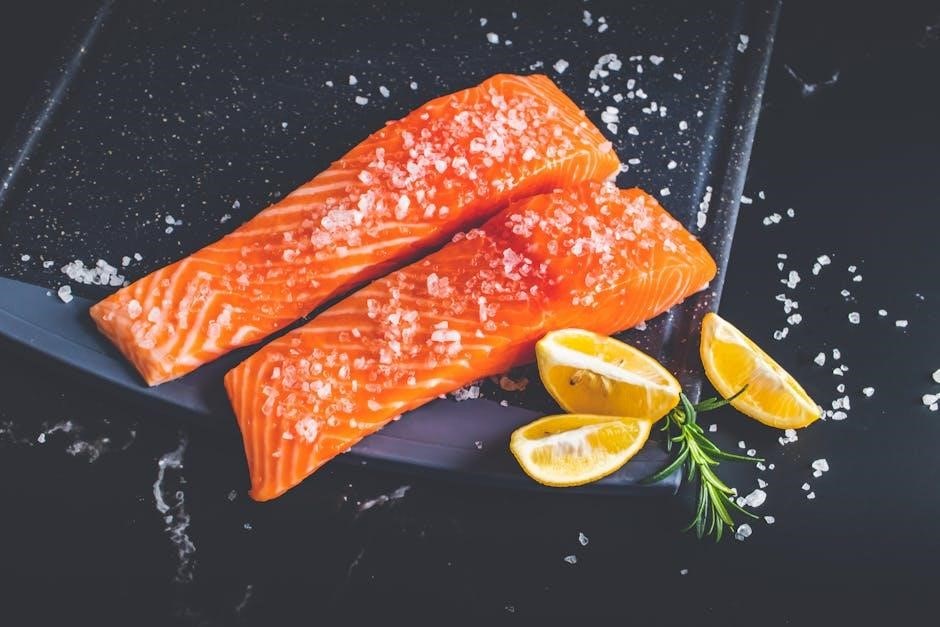
A pescatarian weight loss meal plan combines seafood, plant-based foods, and whole grains for a balanced, nutrient-dense diet. It emphasizes protein-rich fish, healthy fats, and fiber to support sustainable weight loss while maintaining metabolism and energy levels. This plan is designed to be flexible, delicious, and tailored to individual calorie needs, making it an ideal choice for those seeking a healthy lifestyle change.
1.1 What is a Pescatarian Diet?
A pescatarian diet is a plant-focused eating pattern that includes seafood but excludes meat and poultry. It combines the benefits of a vegetarian diet with the addition of fish and other seafood, providing essential nutrients like protein, omega-3 fatty acids, and fiber. This diet is versatile, allowing for a wide variety of flavors and recipes while promoting overall health and supporting weight loss goals. It is a balanced choice for those seeking to reduce meat consumption without sacrificing nutrition or taste.
1.2 Benefits of a Pescatarian Diet for Weight Loss

The pescatarian diet offers numerous benefits for weight loss, including high protein intake from seafood to build and maintain muscle. Omega-3 fatty acids in fish support metabolism and reduce hunger. Whole, nutrient-dense foods promote satiety and digestion. The diet’s focus on low-calorie, high-fiber options like vegetables and whole grains aids in portion control. By naturally redirecting calories to lean protein and healthy fats, it supports sustainable weight loss. This balanced approach ensures long-term success without extreme restrictions, making it an ideal choice for those seeking a versatile and maintainable weight loss plan.
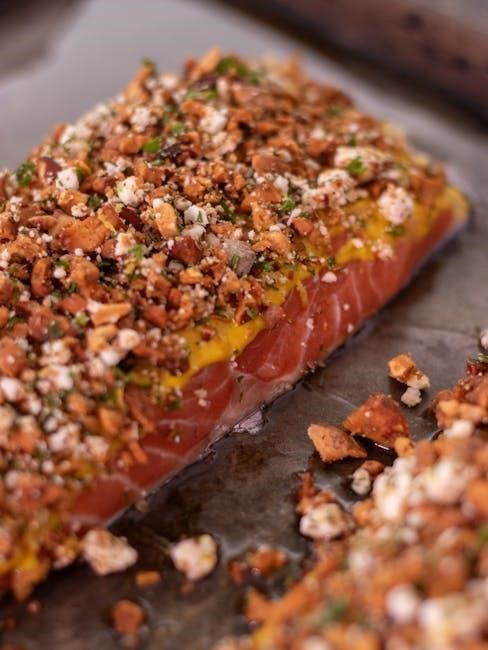
Key Components of a Pescatarian Weight Loss Meal Plan
A pescatarian weight loss meal plan includes plant-based foods, fish, and seafood, combined with whole grains and vegetables. It emphasizes high fiber, vitamins, and minerals, while focusing on healthy fats and portion control to support weight management and overall health.
2.1 High Protein from Fish and Seafood
Fish and seafood are rich in protein, essential for muscle repair and satiety, making them ideal for weight loss. Salmon, tuna, and shrimp provide omega-3 fatty acids, supporting heart health and metabolism. Incorporating a variety of seafood ensures a balanced intake of nutrients while keeping meals flavorful and satisfying. Pairing protein-rich fish with vegetables and whole grains creates well-rounded, filling meals that support weight management and overall well-being.
2.2 Focus on Whole, Nutrient-Dense Foods

A pescatarian weight loss meal plan emphasizes whole, nutrient-dense foods like whole grains, vegetables, legumes, and nuts. These foods are rich in fiber, vitamins, and minerals, helping to control hunger and support metabolism. By avoiding processed and high-calorie options, the plan promotes natural weight loss while ensuring adequate nutrition. Incorporating a variety of colorful vegetables and whole grains provides essential nutrients and keeps meals satisfying, making it easier to stick to the diet long-term.
2.3 Balancing Macronutrients: Carbs, Fats, and Proteins
A pescatarian weight loss meal plan balances carbs, fats, and proteins to optimize metabolism and satisfaction; Whole grains and vegetables provide complex carbs for energy, while healthy fats from avocados, nuts, and fatty fish support heart health. Protein-rich seafood and legumes aid in muscle repair and appetite control. By proportionally distributing these macronutrients, the plan ensures sustained energy, reduces cravings, and supports fat burning, making it easier to maintain a calorie deficit for weight loss.

Sample 7-Day Pescatarian Meal Plan
This 7-day plan offers structured breakfast, lunch, dinner, and snack options, balancing seafood, whole grains, and vegetables for a calorie-controlled, nutrient-dense weight loss journey.
3.1 Breakfast Ideas: Starting Your Day Right
Begin your day with nutrient-rich breakfasts that combine protein, fiber, and healthy fats. Options include overnight oats with chia seeds, avocado toast with poached eggs, or Greek yogurt topped with berries and granola. Incorporate smoked salmon on whole-grain bagels or spinach omelets for a protein-packed start. Smoothies blended with spinach, banana, and almond milk are also a quick, nutritious choice. These meals provide sustained energy and support weight loss by keeping you full and satisfied until lunchtime.
3.2 Lunch and Dinner Recipes: Combining Fish, Vegetables, and Grains
For lunch and dinner, focus on balanced meals featuring fish, colorful vegetables, and whole grains. Try grilled salmon with quinoa and steamed broccoli, or baked cod with roasted sweet potatoes and green beans. Shrimp stir-fries with brown rice and mixed vegetables are also a great option. Tuna salads with avocado and whole-grain wraps offer a refreshing choice. These recipes ensure a mix of lean protein, fiber, and healthy carbs, keeping you satisfied and supporting your weight loss goals while providing essential nutrients for overall health.
3.3 Healthy Snacks to Keep You Satisfied
Incorporate snacks like nuts, seeds, fruits, and veggies to curb hunger between meals. Greek yogurt with berries or a handful of almonds provides protein and fiber. Edamame or air-popped popcorn are low-calorie, protein-rich options. Veggie sticks with hummus or guacamole offer healthy fats and fiber. These snacks support weight loss by keeping you full and preventing overeating, ensuring you stay on track with your pescatarian meal plan while maintaining nutrient balance and satisfaction.
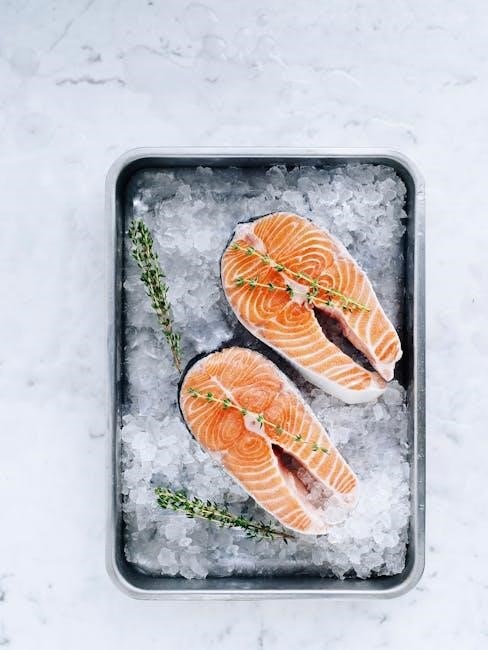
Tips for Successful Weight Loss on a Pescatarian Diet
Focus on balanced nutrition, variety, and mindful eating. Incorporate whole foods, control portions, and stay consistent with your meal plan to achieve sustainable weight loss.
4.1 Portion Control and Calorie Management
Portion control is crucial for weight loss. Use smaller plates, measure servings, and avoid distractions while eating. Aim for meals balancing protein, healthy fats, and fiber. Plan snacks to prevent overeating. A 1500-1600 calorie daily intake is ideal for most adults. Track calories using a food diary or app to stay accountable. Avoid processed foods and focus on whole, nutrient-dense options. Mindful eating helps maintain portion discipline and supports long-term weight management.
4.2 Incorporating Physical Activity
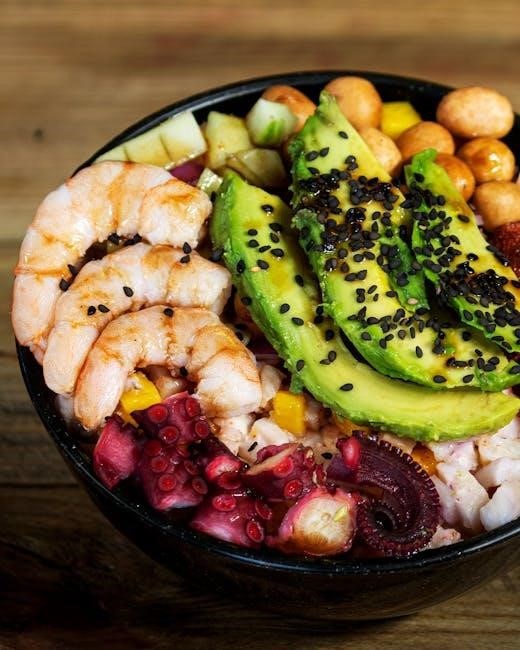
Regular physical activity is essential for weight loss and overall health. Aim for at least 150 minutes of moderate-intensity exercise, such as brisk walking, cycling, or swimming, per week. Strength training and high-intensity interval training (HIIT) can also boost metabolism and burn calories. Pairing physical activity with a pescatarian diet enhances fat loss and improves muscle tone. Consistency is key; even small amounts of daily movement, like walking, contribute to long-term success. Exercise not only supports weight loss but also promotes better mental and physical well-being.
4.3 Avoiding Common Mistakes in Meal Planning
Common mistakes in pescatarian meal planning include overeating, neglecting portion control, and relying on processed foods. To avoid these, focus on whole, nutrient-dense foods like fish, vegetables, and whole grains. Avoid skipping meals, as this can lead to overeating later. Additionally, ensure balanced macronutrients in each meal to maintain satiety and energy levels. Meal prepping and planning ahead can help prevent impulsive food choices. By staying consistent and mindful of calorie intake, you can achieve sustainable weight loss while enjoying the benefits of a pescatarian diet.
The Role of Supplements and Nutrients
Supplements like omega-3s and fiber support weight loss by enhancing metabolism and satiety. Ensure adequate nutrients from whole foods, with supplements filling any dietary gaps.
5.1 Omega-3 Fatty Acids for Health
Omega-3 fatty acids, found in fatty fish like salmon and mackerel, play a crucial role in heart health and reducing inflammation. They support weight loss by improving metabolism and satiety. These essential fats also enhance brain function and overall well-being, making them a key component of a pescatarian diet. Incorporating omega-3-rich seafood ensures a balanced and nutritious meal plan, aiding in long-term health and weight management goals.
5.2 Ensuring Adequate Fiber Intake
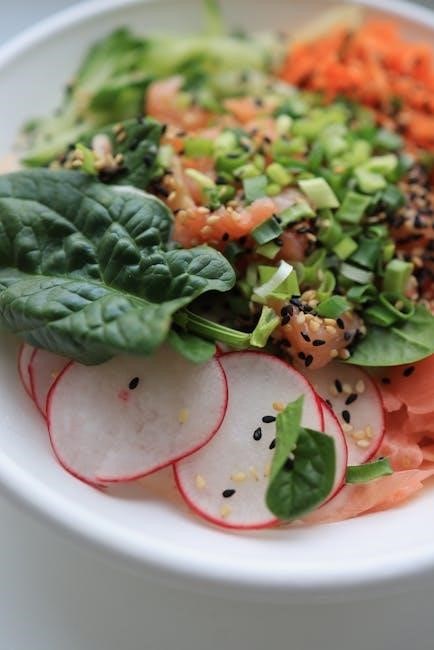
Adequate fiber intake is essential for digestion, satiety, and weight management. A pescatarian diet rich in whole grains, vegetables, and legumes provides ample fiber, promoting a feeling of fullness and reducing overeating. Fiber also supports healthy blood sugar levels and improves gut health. Incorporating fiber-rich foods like quinoa, broccoli, and lentils into meals helps maintain a balanced diet and supports long-term weight loss goals by enhancing metabolic function and overall nutritional balance.
5.4 Staying Hydrated for Optimal Metabolism
Staying hydrated is crucial for maintaining optimal metabolism, which supports weight loss. Water aids in digestion, nutrient absorption, and the breakdown of proteins and fats, including those from fish and seafood. Drinking enough water helps suppress appetite and prevents overeating. Aim for at least 8 cups of water daily, and consider adding herbal teas or infused water for variety. Incorporating water-rich foods like cucumbers and oranges can also contribute to hydration. Proper hydration ensures your body functions efficiently, enhancing your weight loss efforts on a pescatarian diet.
A well-structured pescatarian meal plan promotes sustainable weight loss. Download your free PDF guide and stay motivated by tracking your progress for long-term success.
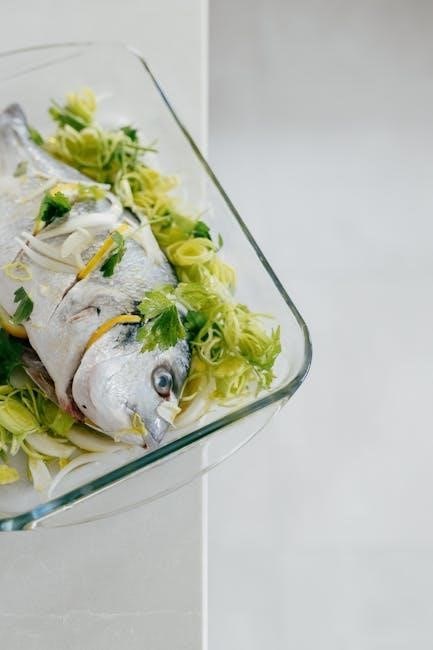
6.1 Downloading Your Free Pescatarian Weight Loss Meal Plan PDF
Download your free pescatarian weight loss meal plan PDF, a comprehensive guide tailored for sustainable weight loss. This printable plan includes a 7-day menu with delicious recipes, portion control tips, and balanced macronutrients. Designed by experts, it ensures you meet your nutritional needs while shedding pounds. Perfect for beginners or seasoned dieters, this PDF is easy to follow and customizable. Start your journey with a structured approach that makes healthy eating enjoyable and achievable. Download now and take the first step toward your weight loss goals!
6.2 Maintaining Motivation and Tracking Progress
Maintaining motivation is crucial for long-term success on a pescatarian weight loss journey. Set realistic goals, track your progress, and celebrate small achievements to stay inspired. Use a journal or app to monitor your meals, workouts, and weight changes. Share your journey with a friend or join a community for accountability. Reward yourself for milestones reached, like trying new recipes or completing a challenging workout. Stay focused on how your healthy choices improve overall well-being, not just the scale. Consistency and patience are key to lasting results.
Related posts:
Discover a pescatarian weight loss meal plan PDF with delicious, easy-to-follow recipes. Achieve your goals with quick, balanced, and nutritious meals. Download now!
Posted in PDF